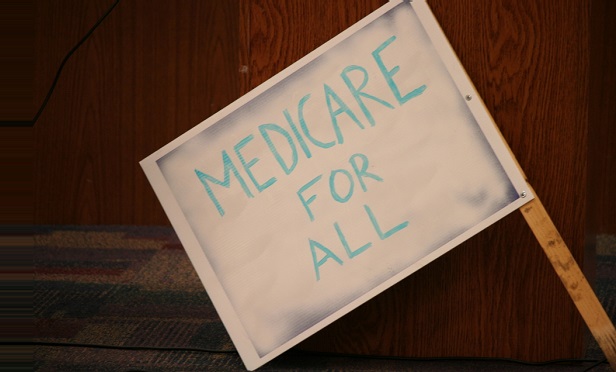 One survey found 56 percent of Americans favor Medicare for All, but another found that 46 percent of Americans said they had not even heard of the concept. (Photo: Shutterstock)
One survey found 56 percent of Americans favor Medicare for All, but another found that 46 percent of Americans said they had not even heard of the concept. (Photo: Shutterstock)An asterisk looms large over those recent surveys showing that a majority of Americans favor a “Medicare for All” type health care plan.
The term has taken off lately in the early days of the 2020 presidential campaign for Democratic hopefuls. Nearly every politician mentioned as a possible candidate for the Democrats supports some version of Medicare for All, and the recent blue wave election that brought Democrats to power in the U.S. House of Representatives featured many outspoken proponents of the term.
Related: Health care industry group launches attack on Medicare for All
The idea also gets a boost in a recent Kaiser Family Foundation poll, which finds that 56 percent of respondents favor a Medicare-type system that would cover all Americans. However, a deeper dig into the numbers of this and other polls finds that some Americans still have reservations about the idea—and others aren't familiar with the term in the first place.
KFF poll: Support hinges on details, who is asked
The KFF poll has raised a lot of eyebrows, and rightly so. In addition to the 56 percent that support the idea of Medicare for All, the poll asks if a similar Medicare-type plan were available to all Americans on a voluntary basis, with people still able to keep their current private insurance if they chose to. Under those conditions, support jumps to 74 percent of those polled. This includes support from nearly half of the Republican respondents, at 47 percent.
But as with all polls, adding more detail can change support significantly either way. When asked about some possible outcomes of a Medicare for All system, support for the term drops when respondents are asked if they favor a system that would eliminate all private insurance plans (37 percent support), require most Americans to pay more taxes (37 percent support), threaten the current Medicare program (32 percent support), or lead to delays in medical tests or treatments (26 percent support).
And large partisan gaps still remain. Only 23 percent of those identifying as Republicans support a national Medicare plan that would replace all private insurance with a government plan. Democratic voter support is almost a mirror view: 81 percent say they would favor such a plan.
NORC survey: Many Americans unclear on the concept
Another survey, released on Jan. 24, suggests that even with the media spotlight on Medicare for All, many Americans are still unfamiliar with the term, or only somewhat familiar with the issue.
The poll was conducted by NORC at the University of Chicago, a nonpartisan research institute. It found that 46 percent of Americans said they had not heard of the Medicare for All concept. In the poll, only 13 percent said they had heard a lot about the idea, and 40 percent said they had heard “some” talk about Medicare for All.
Perceptions varied on what a Medicare for All plan would mean for Americans. The NORC poll found 55 percent of respondents thought participation in such a plan would be optional; 41 percent expected it to be mandatory. A plurality believed such a plan would increase U.S. health spending overall (47 percent), and a large majority (69 percent) believed a Medicare for All plan would increase the number of Americans with health insurance coverage.
Interestingly, respondents were split on the impact of such a system on quality of health care: 30 percent said it would reduce quality; 28 percent said quality would increase. In addition, nearly half (47 percent) said that a Medicare for All system would reduce out-of-pocket costs for consumers.
The NORC analysis suggests that respondents felt that a Medicare for All plan would help with some concerns, but would not be a silver bullet to fix the nation's health care issues.
“People expect that Medicare for All will address the issues that matter most to them, namely reducing out-of-pocket costs and increasing breadth of coverage.” said Michelle Strollo, vice president at NORC. “At the same time, they seem to recognize that such benefits would come at a cost, with a Medicare for All plan likely to drive up total U.S. health care spending.”
Read more:
© 2025 ALM Global, LLC, All Rights Reserved. Request academic re-use from www.copyright.com. All other uses, submit a request to [email protected]. For more information visit Asset & Logo Licensing.







